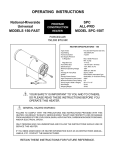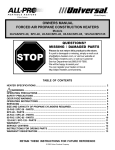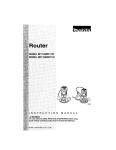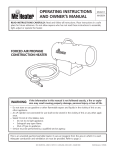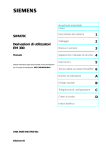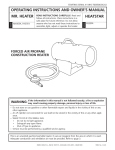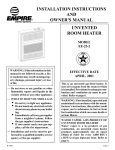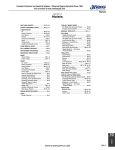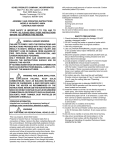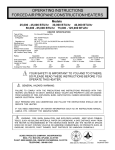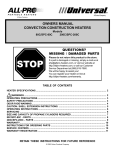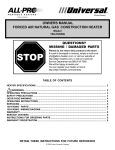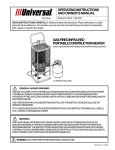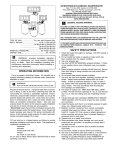Download Scheu Products Company 85-FAC/SPC-85 Operating instructions
Transcript
OPERATING INSTRUCTIONS National-Riverside Universal80-FAP HEATERMODEL MODEL 3500-FACV SPC ALL-PRO PROPANE CONSTRUCTION HEATER MODEL SPC-350 FORCED AIR VARIABLE 175,000 TO 350,000 BTU/HR HEATER SPECIFICATIONS Type of Gas Input Rating Variable Fuel Consumption Gas Supply Pressure to Regulator Regulator out Fuel Orifice Size Electrical Input Minimum Operating Voltage Fan Ignition Spark Generator Primary Flame Control High Temperature Control Min. Ambient Temperature Rating Thermostat Control Size (Length x Width x Height) Net Weight Shipping Weight ! ! For Use with Propane Only Maximum: 350,000 BTU/hr Minimum: 175,000 BTU/hr 8.8-16.2 lbs/hr Maximum: bottle pressure Minimum: 20 psig 20 psig #45 Drill 115V, 60 Hz, 10, 7a 100V 1725 rpm, 1400 cfm Direct Spark, Interrupted Type Solid State, 15,000V, Across 1/8"Gap Solid State, 10-15 Second Timing 240oF 0oF 35oF-85oF 31" x 13" x 20" 54 lbs. 56 lbs. YOUR SAFETY IS IMPORTANT TO YOU AND TO OTHERS, SO PLEASE READ THESE INSTRUCTIONS BEFORE YOU OPERATE THIS HEATER. GENERAL HAZARD WARNING: FAILURE TO COMPLY WITH THE PRECAUTIONS AND INSTRUCTIONS PROVIDED WITH THIS HEATER, CAN RESULT IN DEATH, SERIOUS BODILY INJURY AND PROPERTY LOSS OR DAMAGE FROM HAZARDS OF FIRE, EXPLOSION, BURN, ASPHYXIATION, CARBON MONOXIDE POISONING, AND/OR ELECTRICAL SHOCK. ONLY PERSONS WHO CAN UNDERSTAND AND FOLLOW THE INSTRUCTIONS SHOULD USE OR SERVICE THIS HEATER. IF YOU NEED ASSISTANCE OR HEATER INFORMATION SUCH AS AN INSTRUCTIONS MANUAL, LABELS, ETC. CONTACT THE MANUFACTURER. RETAIN THESE INSTRUCTIONS FOR FUTURE REFERENCE. OPERATING PRECAUTIONS SAFETY PRECAUTIONS This is a propane, direct-fired, forced air heater. It's intended use is primarily temporary heating of buildings under construction, alteration or repair. 1. ! WARNING NOT FOR HOME OR RECREATIONAL VEHICLE USE 3. 4. Propane is heavier than air. If propane leaks from a connection or fitting, it sinks to the floor, collecting there with the surrounding air, forming a potentially explosive mixture. Obviously, propane leaks should be avoided, so set up the propane supply with utmost care. Leak check new connections or reconnections with a soap and water solution and follow all connection instructions herein. Also, ask your propane dealer for advice on the propane supply installation and ask him to check it if there are any questions. 5. Direct-Fired means that all of the combustion products enter the heated space. Even though this heater operates very close to 100 percent combustion efficiecy, it still produces small amounts of carbon monoxide. Carbon monoxide (called CO) is toxic. We can tolerate small amounts but not a lot. CO can build up in a heated space and failure to provide adequate ventilation could result in death. The symptoms of inadequate ventilation are: headache dizziness burning eyes and nose nausea dry mouth or sore throat So, be sure to follow advice about ventilation in these operating instructions. 8. Forced Air means that a blower or fan pushes the air through the heater. Proper combustion depends upon this air flow; therefore, the heater must not be revised, modified or operated with parts removed or missing. Likewise, safety systems must not be circumvented or modified in order to operate the heater. When the heater is to be operated in the presence of other people the user is responsible for properly acquainting those present with the safety precautions and instructions, and of the hazards involved. 2. 6. 7. 9. 10. 11. 12. 13. 14. 15. 16. 17. Check the heater thoroughly for damage. DO NOT operate a damaged heater. DO NOT modify the heater or operate a heater which has been modified from its original condition. Use only propane gas. Use only VAPOR WITHDRAWAL propane supply. If there is any question about vapor withdrawal, ask your propane dealer. Mount the propane cylinders vertically (shutoff valve up). Secure them from falling or being knocked over and protect them from damage. Locate propane containers at least 7 ft. from the heater and do not direct exhaust toward containers. Use only the hose and regulator assembly provided with the heater. Inspect hose assembly before each use of the heater. If there is excessive abrasion or wear, or hose is cut, replace with hose assembly listed on parts list before using heater. For indoor use only. Area must be well ventilated. Provide minimum openings of 3 sq. ft. near the floor and 3 sq. ft. near the ceiling (also see "Operating Precautions"). If at any time gas odor is detected, IMMEDIATELY DISCONTINUE operation until the source of gas has been located and corrected. Install the heater such that it is not directly exposed to water spray, rain and/or dripping water. Maintain minimum clearance from normal combustible material (like paper) as follows: floor-0 ft.;outlet-8 ft.; sides-2 ft.; top-3 ft. Locate 10 ft. from canvas or plastic tarpaulins or similar coverings and secure them to prevent flapping or movement due to wind action. Operate only on a stable, level surface. Do not use with ductwork. Do not restrict inlet or exit. Use only the electrical power specified. The electrical connection and grounding must comply with National Electrical Code - ANSI/NFPA 70. Use only a properly grounded 3-prong receptacle or extension cord. Do not move, handle or service while hot or burning. Use only in accordance with local codes or, in the absence of local codes, with the Standard for the Storage and Handling of Liquefied Petroleum Gases ANSI/NFPA 58-1998. WARNING: FIRE, BURN, INHALATION, AND EXPLOSION HAZARD. KEEP SOLID COMBUSTIBLES, SUCH AS BUILDING MATERIALS, PAPER OR CARDBOARD, A SAFE DISTANCE AWAY FROM THE HEATER AS RECOMMENDED BY THE INSTUCTIONS NEVER USE THE HEATER IN SPACES WHICH DO OR MAY CONTAIN VOLATILE OR AIRBORNE COMBUSTIBLES, OR PRODUCTS SUCH AS GASOLINE, SOLVENTS, PAINT THINNER, DUST PARTICLES OR UNKNOWN CHEMICALS. Page 2 PROPANE FUEL PRECAUTIONS WARNING: Local codes for installation of propane systems may vary considerably. Therefore, ask your local propane supplier for advice on propane system installation in your particular area. In the absence of local codes, install in accordance with American National Standards Institute (ANSI)/National Fire Protection Association (NFPA) publication Standard for the Storage and Handling of Liquefied Petroleum Gases ANSI/ NFPA 58-1998. Your supplier, fire marshal or library should have a copy. The propane supply system must be arranged for vapor withdrawal. Propane cylinders must be secured in the upright position to keep them from falling or being knocked over. During use, liquid propane in a container vaporizes. As it vaporizes, the propane cools itself. If this cooling process continues long enough and proceeds fast enough, the propane temperature and pressure will fall so low that heater operation may be improper or even impossible even though plenty of propane remains in the container. Often frost forms on the outside of the propane container as a warning of excessive refrigeration. Recommendations to reduce the ill effects of refrigeration are: * Provide considerably more propane than you plan to consume. As a rule of thumb, provide twice as much. * Fill containers frequently, especially in cold weather. Never allow propane to fall below one-third of container capacity. * If possible, keep containers in a warm area. Under no circumstances should the heater exhaust be directed toward the propane container. * Watch for frost formation on the container. If it occurs, discontinue use of the heater and refill the container. SIZE AND CAPACITY OF PROPANE CYLINDERS MAXIMUM OPERATING TIME - HOURS The chart below shows the approximate size of the cylinder required for this heater. To use the chart: 1. Select the lowest air temperature expected (at the bottom of the chart). 2. Move straight up to time of operation desired (left side of chart). 3. Read the number of cylinders required. Rather than using several 100-lb. cylinders, it may be preferable to use a larger container installed outside (consult your propane supplier). * Full cylinders * Good air circulation * No frost on cylinders OPERATING INSTRUCTIONS PREPARING FOR OPERATION 1. Check the heater for possible shipping damage. If any is found, immediately notify your dealer. 2. Follow all of the "Precautions" on pages 2 & 3. 3. Connect the POL fitting of hose and regulator assembly to the propane cylinder by rotating the POL nut counterclockwise into the propane cylinder's valve outlet and securely tighten with a wrench. 4. Connect the hose to the heater by rotating the hose fitting clockwise. 5. Securely tighten all gas connections. 6. Open the cylinder's gas valve and check all gas connections with a soap and water solution. DO NOT USE A FLAME. 7. Connect power cord to well-grounded 115V, 60 Hz, 10 source of power. 8. When using an extension cord, make certain that it is a 3-wire (grounded) cord of proper wire size. See chart on page 4. START 1. Slowly open the main valve at propane cylinder to prevent excess flow check valve from closing. 2. Set thermostat to full on (turn knob clockwise to pin stop). Heater will ignite automatically. 3. Adjust ball valve on control panel to desired burn rate. Valve Handle Position Full counterclockwise Full clockwise Burn Rate 350,000 BTU/hr 175,000 BTU/hr 4. Set thermostat to desired temperature. Heater will turn off and on automatically as the temperature varies in the heated area. STOP 1. Securely close valve on the propane cylinder. 2. Continue to operate heater until all fuel in the hose has burned. 3. Turn thermostat off. RESTART AFTER SAFETY SHUTDOWN 1. Securely close valve at propane cylinder. Turn heater off. 2. Wait 5 minutes. 3. Restart following "Start" procedure. MAINTENANCE AND STORAGE 1. The heater should be inspected before each use, and at least annually by a qualified person. 2. Before each use, check the soft "O" ring seat at the bullnose of the POL fitting. If the "O" ring is cut, scuffed, or otherwise damaged, replace it with part number 6681. 3. Turn off the gas at the LP-gas supply cylinder(s) when the heater is not in use. 4. When the heater is to be stored indoors, the connection between the LP-gas supply cylinder(s) and the heater must be disconnected and the cylinder(s) removed from the heater and stored out of doors and in accordance with Chapter 5 of the standard for Storage and Handling of Liquefied Petroleum Gases ANSI/NFPA 58-1998. Page 3 AIR TEMPERATURE - oF 3500FAC-V ITEM PART NO. NO. DESCRIPTION 1 2 3 4 5 6 7 8 9 10 11 12 13 14 15 16 17 18 19 20 21 22 23 24 25 26 27 28 29 30 3178 1174 6229 6010 6073 6225 7095 1486 1546 1491 1487 1663 3017 7121 7118 6168 3652 6224 6226 1616 7343 1125 7355 6121 1735 3441 1507 6223 1036 3180 Motor Support Motor Assembly Spacer, Fan Set Screw Fan 12" CCW 1/2 ID HUB Snap Bushing Handle Burner Shell Assembly Cylinder Burner Tube Assembly Flame Holder Assembly Middle Cylinder Grid Assembly Keeper Spacer Electrode High Limit Control Assembly Fuel Nozzle Snap Bushing Universal Bushing Fuel Tube Assembly Fitting, Female Tee, 1/4" Valve Assembly Fitting, Male Plug, 1/4 MPT Fitting, Male Elbow, 1/4 FLR x 1/4 MPT Thermostat Mounting Assembly Bracket, Thermostat Mounting Thermostat Knob Assembly Strain Relief Bushing Power Cord Assembly Inlet Grill Assembly ITEM PART QTY. NO. NO. DESCRIPTION 1 1 1 2 1 3 1 1 1 1 1 1 4 4 1 1 1 1 1 1 1 1 1 1 1 1 1 1 1 1 31 32 33 34 35 36 37 38 40 41 42 43 44 * * * * * * * * * * ++ ++ ++ ++ QTY. 6118 Filter 1/4 Pipe Insert 1614 Panel, Control Assembly Ram 7431 Ball Valve 6151 Hose Assy LP 7406 Regulator 20 psi 6252 POL Excess Flow 10739Control Flame Assembly ** 1731 Control Box Assembly 6144 Ftg., Male Connector 5/16 FLR x 1/4 MPT 7094 Clip Handle Mounting 3653 Bracket, Flame Control 7372 Ftg., Male Connector 5/16 FLR x 1/8 MPT 7431 Ball Valve 6070 Loop Clamp, 5/16" 6312 Manual, Operating Instructions 6369 Label, Warning, Fuel 6373 Label, Fan Rotation 6374 Label, Electrical Ground 6383 Label, Universal Logo 7341 Label, Model, Operating Instruction 7403 Label, Wiring 6712 Label, Hangtag LP Hose 7339 Parts List/Wiring Diagram 10739 Alternate Flame Control Assembly 7801 Flame Control CP Mark 10 DN 7808 Flame Control Potted CP Mark 10 DN 6641 Terminal Board *Item not shown on exploded view ++Alternate Control not shown 1 1 1 1 1 1 1 1 1 2 1 1 1 2 1 1 1 1 1 1 1 1 1 1 1 1 1 7339F SEPTEMBER 1999 3500FAC-V WIRING DIAGRAM SCHEMATIC DIAGRAM CONNECTION DIAGRAM GAS VALVE GAS VALVE ELECTRODE ELECTRODE CHASSIS GROUND CHASSIS GROUND HI-LIMIT SWITCH FLAME CONTROL THERMOSTAT GROUND (GRN) (B/G) HI-LIMIT SWITCH NEUTRAL (WHT) (L2) MOTOR LINE NEUTRAL VALVE GREEN TB FLAME CONTROL (CP MARK 10 DN) THERMOSTAT CHASSIS GROUND LINE CORD CHASSIS GROUND B G Y O COLOR CODE BLACK R RED GREEN W WHITE YELLOW ORANGE MOTOR VALVE (V2) VALVE (V1) LINE (L1) NEUT (L2) GRD THERMOSTAT IGN (ORG) ELECTRODE MOTOR FLAME CONTROL (RAM 1M501) (CP MARK 10 DN) HI-LIMIT SWITCH LINE CORD GAS VALVE LEGEND TERMINAL BOARD CHASSIS GROUND Y TERMINAL MALE CONN. FEMALE CONN. LINE (BLK) (L1) VALVE (RED) (MV) (V1) ALT. VALVE CONN. (MVG) (V2) If any original wiring as supplied with the heater must be replaced, it must be replaced with type AWG 105o C wire or its equivalent except as indicatd (*type SF 2-200, **SGI 250o C) 7403C WIRING CHART PART NO. 1110 1721 1721 1722 1617 1807 1807 1959 1959 1959 1959 COLOR GREEN Red (Hi-Temp) Red (Hi-temp) Red (Hi-Temp) Orange Black Black Green Red White Black LENGTH 4 1/2” 13” 13” 23” 19” 12” 12” 7” 7” 6” 6” FROM TO Flame Control (Ground) High Limit Switch High Limit Switch High Limit Switch Flame Control (Ignition) Gas Valve Gas Valve Flame Control (Harness) Flame Control (Harness) Flame Control (Harness) Flame Control (Harness) INSTRUCTIONS FOR ORDERING PARTS All parts orders must show heater Model No., Item No., Part No., and Description. We recommend that only parts supplied by the manufacturer be used on this unit. A locally purchased part may appear to be identical, although in reality it might endanger the heater or the persons operating the heater. Ground Valve (Yellow or Black) Harness (Red) Flame Control (Valve) Electrode High Limit Switch Flame Control Ground High Limit Switch Terminal Block Terminal Block The heater should be serviced only by a trained, experienced service person. Read the section on “Servicing” before ordering parts. For parts order, call (909) 981-5343. SERVICING A hazardous condition may result if a heater is used that has been modified or is not functioning properly. When the heater is working properly: * The flame is contained within the heater. * The flame is essentially blue with perhaps some yellow tipping. * There is no strong disagreeable odor, eye burning or other physical discomfort. * There is no smoke or soot internal or external to the heater. * There are no unplanned or unexplained shutdowns of the heater. The parts lists and wiring diagram show the heater as it was constructed. Do not use a heater which is different from that shown. In this regard, use only the hose, regulator and cylinder connection fitting (called a POL fitting) supplied with the heater. Do not use alternates. For this heater, the regulator must be set to supply 20 psig outlet pressure. If there is any uncertainty about the regulator setting, have it checked. A heater which is not working right must be repaired, but only by a trained, experienced service person. Contact the factory for the service center closest to you, phone number (909) 981-5343 or visit our website at www.scheuco.com. You may also obtain in-warranty or out-of-warranty service by returning the product freight prepaid to: Scheu Products Company 8855 Baker Avenue Rancho Cucamonga, CA 91730 In-warranty products returned to the Service Department will be repaired with no charge for either parts or labor and will be returned to you freight prepaid. Please include a brief statement indicating date, place of purchase, the nature of the problem and proof of purchase. Out-of-warrranty products returned to the Service Department will be repaired with a charge for parts and labor and will be returned to you freight collect. TECHNICAL INFORMATION HOW MUCH HEAT DO I REQUIRE? For economy, it is important to match input to that required. But heat requirements often vary. For example, it usually takes a lot more heat to get things warm than it does to keep them that way. Likewise, outside air temperature ususally changes during the day so you may need more heat at night than you do in the daytime. An approximation of the heat required can be found by using the chart below. BTU'S PER HOUR REQUIRED Cubic feet of space to be heated Temperature Rise Required (oF)* 20o 30o 40o 50o 5,000 14,000 20,000 27,999 34,000 7,000 19,000 28,000 38,000 47,000 10,000 27,000 40,000 54,000 67,000 15,000 40,000 60,000 80,000 100,000 20,000 54,000 80,000 107,000 133,000 30.000 80,000 120,000 160,000 200,000 50,000 133,000 200,000 266,000 333,000 WARNING: When using a thermostat the heater exit area should be protected from personnel and warnings posted of sudden startup. Recommended Minimum Gauge for Cord Extensions Wire Gauge Chart A.W.G. Name Plate 120V Amps. 25 5-6 6-8 8-12 10-12 12-14 18 18 18 16 16 Cord Length in Feet 50 100 150 16 16 14 14 12 14 12 12 10 10 12 10 10 8 8 ANSI Z83.7b-1993/CGA 2.14-1972 Construction Heater Page 4 SCHEU PRODUCTS COMPANY, INCORPORATED MAIL: P.O. BOX 250, UPLAND, CA 91785 PLANT: 8855 BAKER AVE., RANCHO CUCAMONGA, CA 91730 TELEPHONE: 909-981-5343 P/N 6312S September 2000






